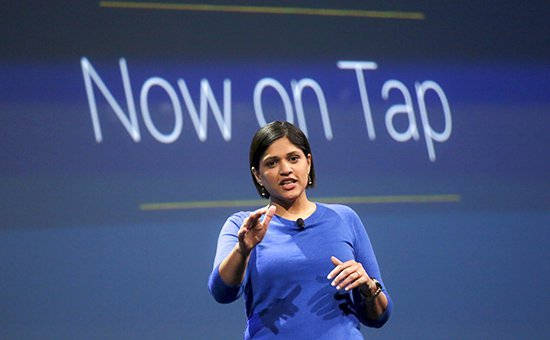Google Now CEO Tells Project Development

Aparna Chennapragada has been with Google for six years. Since 2012, she has been the manager of the Google Now project, which was launched as a personal assistant in the Google search application. Speaking about her project in an interview with RBC magazine, she emphasizes that Google Now differs from the traditional search on the Internet in the first place in that it can not only provide information on the entered question, but also predict the question itself. That is, here Google learns to offer answers to queries not yet entered.
As an example of the successful use of the search, Aparna offers the following situations: a person is in a shopping center and probably would like to get his plan, and Google Now offers the user a plan for the shopping center, evaluating his current location; if someone came to Disneyland, then it’s obvious that people will be interested in attractions, based on this assumption, Google Now can find and offer relevant information.
Another key difference of Google Now is that it not only displays links to pages with an answer to a question, but also gives an answer. That is, according to Aparna, if a user makes a request for traffic at a given time in a specific territory, then the system should understand that in fact he is interested in the time during which he can get, for example, from work home, and give him this data .
The head of Google Now also talked about the fact that the context of using the service at a certain moment is the most important thing. The service already knows how to take into account many factors in order to give the user the most relevant information. The personal interests of users and their location, as well as other things, reflected in the network, are taken into account.
One of the interests of the project is to facilitate the movement of users in cities. The difficulty is that the infrastructure of different cities is different, and if in some places people travel by car, in others they prefer public transport. And so the system must understand the differences. The project team is working to ensure that the search shows users important and relevant information.
Aparna also noted that voice search technologies have taken a huge step forward over the past three years. According to a study conducted by Google last year, people have become twice as likely to use voice search, especially for teenagers.
Aparna says that now the company is focused on making the product really useful for users, so that they return to it again and again. Larry Page called the peculiar test of the success of the product in people “a toothbrush test”: if the product is used at least twice a day, then it has the right to life.
